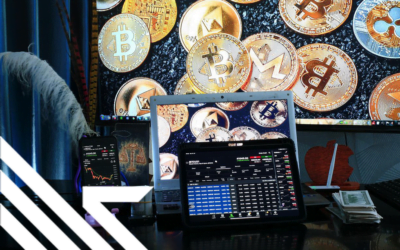The volume traded on peer-to-peer (P2P) exchanges is growing, especially in countries with restrictive laws or where regulators have advised financial institutions against facilitating crypto trading.
According to a 2021 report by the blockchain research firm Chainalysis, P2P exchanges also register huge transaction volumes and drive cryptocurrency usage in emerging markets. For example, Kenya, Nigeria, Vietnam, and Venezuela scored the highest in the year’s crypto adoption index.
What is a P2P crypto exchange?
A P2P crypto exchange is an online marketplace that matches a seller and buyer of crypto such as Bitcoin and also facilitates them to transact directly with one another.
The P2P exchanges take the responsibility of applying for and managing bank accounts that make and receive payments for crypto trades from a company that must meet regulatory requirements and vests it on the individual investors.
When buying crypto on a P2P exchange, you send the agreed price from your account to that of the seller. To the bank, the payment is just another transaction between two individual customers, not between a customer and a money services business.
In contrast, a regular centralized exchange must not only register as a financial services business in the jurisdiction it intends to serve but also apply for an account with a bank.
While applying for the bank accounts, the company behind the exchange has to disclose the business it is involved in. That allows the financial institution to decide if they are in the legal position to facilitate crypto transactions.
In many countries, the banks follow instructions from the regulators and decline to open bank accounts for crypto exchanges.
P2P crypto exchanges Vs. decentralized crypto exchanges
It is easy to confuse Peer-to-peer (P2P) marketplaces and decentralized exchanges (DEXs). However, the two are very different in how they facilitate crypto conversion trades and even how they are built, owned, and run.
A P2P exchange is built, owned, and run by a registered company. It is a website that matches sellers and buyers and facilitates crypto transfers from one wallet to another. The marketplace cannot exist without a legally registered entity behind it.
The company behind the P2P marketplace maintains it and also makes critical decisions on day-to-day operations, including hiring and managing a customer support team. The company must also continuously meet regulatory requirements such as asking users to identify themselves by providing government-issued documents and sharing their current addresses.
Meanwhile, regulators have leverages they can use to easily put pressure on a P2P exchange to do what they deem is legally necessary. For example, they can deregister the company, and the shareholders or those in its management may be subject to criminal or civil proceedings. Indeed, a P2P exchange can easily be taken offline as it is mainly a portal or website hosted on a server.
On the other hand, a decentralized exchange (DEX) is a sovereign application on the blockchain whose processes are guided by a smart contract. A DEX does not need a formally registered company behind it. Once launched, it takes a life of its own and can be used from anywhere as long as there is an internet connection.
When trading on a DEX, one does not sell or buy directly from others. As a trader, you never interact with anyone except a liquidity pool managed by a smart contract. The assets you send go into a liquidity pool and what you receive comes from a liquidity pool. So you basically trade with a smart contract.
Other investors incentivized by a commission provide the assets in the liquidity pool. Because of how it is designed, you can only exchange one crypto asset with another on a DEX, such as Bitcoin for ETH. You cannot convert between crypto and fiat.
Meanwhile, regulators have little leverage to force a DEX to follow their instructions. That is because it is often just a code running on a peer-to-peer network of computers. Indeed, because a DEX is domiciled on a blockchain, it is difficult for anyone, including regulators, to shut it down.
There are also no shareholders or management to arm-twist or target for enforcement.
P2P vs. regular exchange
While a P2P exchange facilitates a buyer and seller transacting directly with each other as a passive middle person, a regular exchange generally buys from sellers and sells to buyers. It is an active middle person.
Meanwhile, regular exchanges differ from DEXes because the former is a registered company, not a smart contract on the blockchain.
The first peer-to-peer exchange was LocalBitcoins, which was initially designed to facilitate people living in close proximity to meet in person and trade crypto. Today almost all P2P exchanges facilitate remote transactions (traders never meet in person).
The list of most popular P2P exchanges includes:
How to sell crypto on a P2P exchange
The primary features of P2P exchanges are an ads page, where sellers and buyers can post their offers, a crypto wallet to keep the assets, a chat feature to communicate, and an escrow account to hold the assets while the fiat payment is completed.
Before initiating a sale, one must send their crypto to their wallet on the P2P exchange. Everyone with an account on the platform can create wallets for the assets traded there.
To begin trading, you can choose an existing offer or create your own offer ad. Once someone accepts your offer and a trade is initiated, the crypto is sent into the escrow account. It will remain there until the buyer sends the seller the agreed price through the agreed payment channel.
Once the seller confirms receiving the money, they release the assets in the escrow to the buyer. If the buyer and the seller can’t agree if the payment has been made, the crypto stays in the escrow as a moderator resolves the dispute.
Advantages of P2P exchanges
The use of P2P exchanges has grown over time, thanks to several advantages of the model. The following are the most notable strengths of peer-to-peer crypto marketplaces:
Aligns with local restrictions
Even though crypto is increasingly getting mainstream acceptance, including being recognized as legal tender in some countries, there are many jurisdictions around the world where regulators have still not approved exchanges or put pressure on financial institutions not to facilitate crypto-related transactions.
In such countries, a platform that matches traders and facilitates trading directly with one another becomes a handy option. On a P2P exchange, the payments between buyers and sellers become ordinary transactions between customers.
It is secure
Even though it is individuals trading, the P2P platforms are designed such that there is security for both. For example, the crypto is sent into an escrow account when a transaction is initiated. It is then released once the seller acknowledges they received payment.
This is much more secure than, for example, meeting someone on an online forum and trusting them enough to trade. If you pay them first, they might refuse to meet their end of the bargain.
Also, P2P exchanges provide dispute resolution mechanisms. They also have reputation systems that help users choose trustworthy people to do business with. On most P2P, it is also a requirement that users verify their identity.
Support local fiat payment methods
The P2P marketplaces are designed to handle only the crypto side of the transaction. Meanwhile, for the fiat currency transfer, the counterparties can choose a payment option that is convenient for both of them.
This makes P2P exchanges flexible and easy to use in local markets. For example, if you are in the US, you might choose to use a bank wire transfer. Meanwhile, in Kenya, you can use a mobile money service instead.
Prices can be negotiated
On ordinary exchanges, the system fixes prices, and an investor has no leeway. On the P2P marketplaces, the prices are automatically set by the system, but the buyer and the seller can override it and agree on a slightly different and more convenient rate for both.
Disadvantages of P2P exchanges
The following are some of the major weaknesses of P2P exchanges:
High risk of fraud
The P2P exchanges are designed with features that protect the buyer and the seller. These include the escrow account, reputation, and verification systems. Nevertheless, loopholes that a scammer can use to steal from you exist.
For example, a seller can receive payment and decline to release funds from the escrow. That leads to a dispute, and in some cases, the fraudster might persuade the arbitrator that they didn’t receive it. They will then keep the cash and also the crypto.
However, the common fraud is tricking a seller into releasing their crypto from escrow before receiving payment. One way this is achieved is by sharing a link that approves the release of funds from escrow through a social messaging app like Whatsapp with a ruse that clicking on it will unlock the fiat payment channel.
It is also common for scammers to make payments through bank transfers and reverse the transaction once they have received the crypto. While the fiat transaction can be reversed, the crypto transaction cannot.
Inadequate customer support
The trading platforms, especially when faced with high trading activity, might not effectively handle the increased number of disputes and customer support queries.
Indeed, on some P2P platforms, a ticket might take weeks to resolve.
Too much price haggling
While the prices being open to negotiation can be a good thing, it can also lead to a poor user experience. This is especially the case where a user indicates a price that seems like a great deal on their offer ad to get attention and then proceeds to suggest a different price when approached.
The haggling over price can also be time-wasting. Meanwhile, if negotiating, particularly price haggling, is not something you are good at, it might cost you every time you trade.
Non-responsive traders
It is common to initiate a trade, and the other person does not take it up. You might have to reach out to several traders before finding one willing and ready to trade.
You might often run into inconsiderate people who will hold your assets in escrow for hours even though they are not interested in trading. In some cases, the funds might be held because the other trader is not online. In other cases, it could be the other person just being inconsiderate.
If you need funds urgently, this might inconvenience you greatly.
Unclear fees
On some P2P platforms, you might not know the actual fees you pay for the transaction. You might only find out after concluding the transaction.
In addition to taking more than you are comfortable with, this prevents you from planning adequately.
Limited amount of assets supported
LocalBitcoins, the most popular P2P exchange, supports only Bitcoin. Meanwhile, Paxful supports three assets (Bitcoin, Ethereum, and USDT). That is insignificant considering that there are nearly ten thousand different crypto assets.
Great alternative
Besides ordinary exchanges, Decentralized exchanges, and P2P exchanges, there are a few other services you can use to convert between crypto and fiat.
One of these that is becoming popular is crypto debit cards.
A crypto debit card is similar to other debit cards, including being supported by mainstream payment processors such as Visa or Mastercard. However, instead of using fiat to load it, you use crypto.
In essence, behind the crypto debit card is an exchange that converts your assets to fiat. That makes it possible for you to withdraw from mainstream ATMs and spend in millions of stores worldwide.
You can convert crypto to fiat using the card from anywhere around the world where Visa and Mastercard are accepted. Meanwhile, the exchange behind the card needs to get a license to operate as a financial service in only one country.
The major weakness of debit cards is that the issuing company might not ship and support the card to your country. Most often also have low limits, and they might support fewer assets.
A few brands, including Club Swan, are taking steps to make crypto debit cards available in most countries and have relatively high limits. Also, the Club Swan debit card supports up to 100 different types of crypto assets.
Image courtesy of Pixabay.




